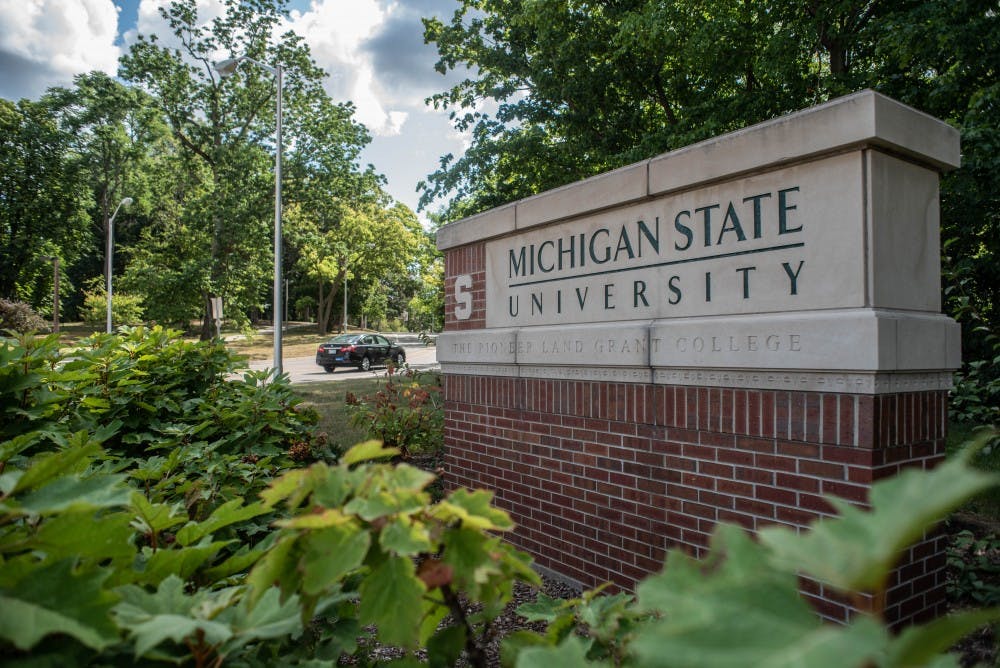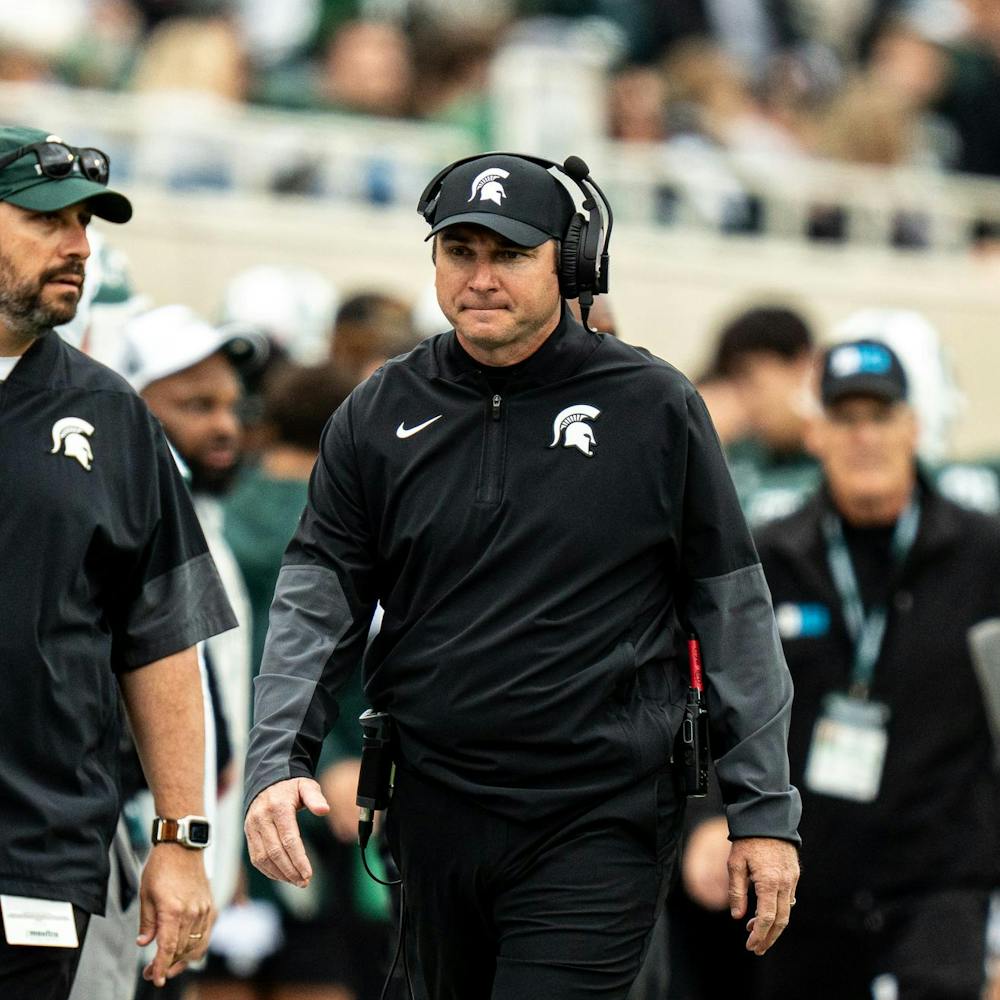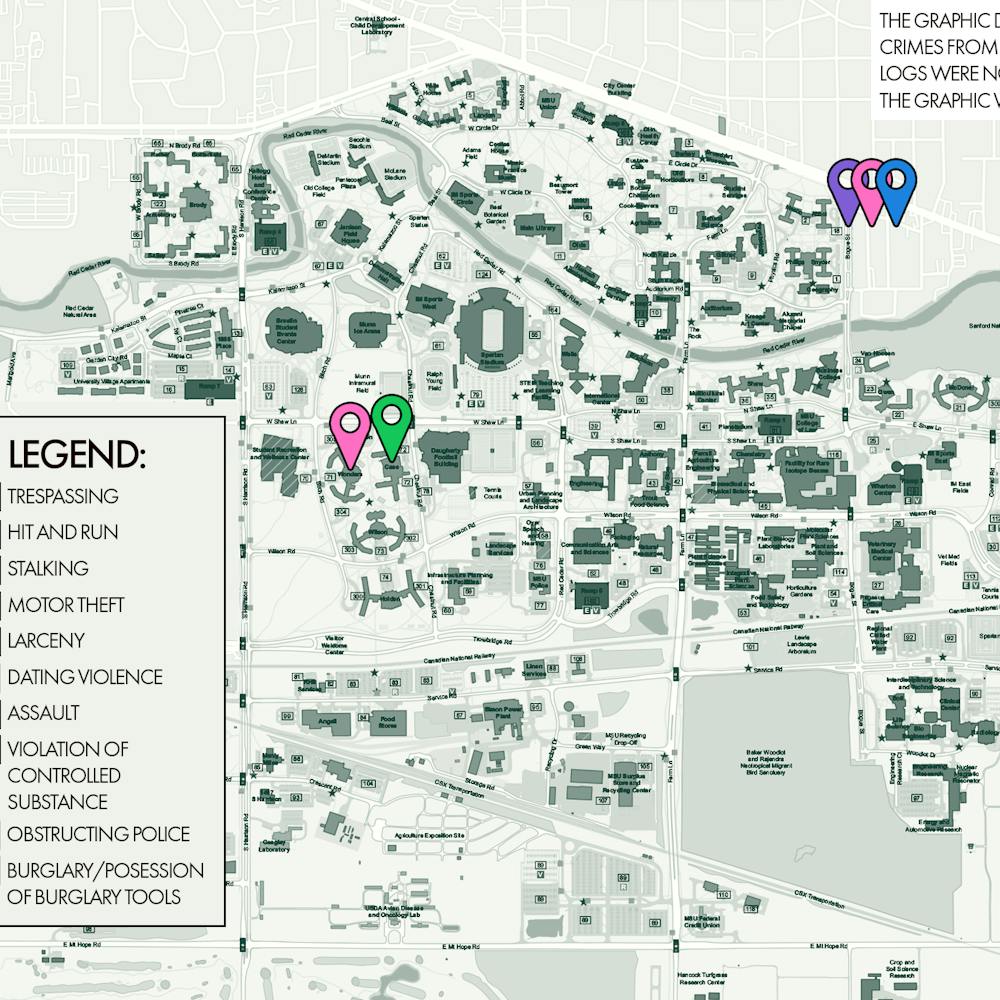Zecher had several similar meetings with campus constituents this week to talk about MSU’s investments, including concerned faculty members and members of the Hurriya Coalition, a coalition of student groups who are calling for divestment.
Hurriya criticized the university’s meeting with the media, saying in a statement yesterday that reporters “will be inundated with lies from the University.”
An hour before meeting with Zecher and other high-level university officials themselves, the group held a rally in front of the Hannah Administration Building to draw attention to their cause.
‘No new money flows to Israel’
Activists have focused much of their attention on a $236,114 bond listed in the university’s 2023 investments that is titled “Israel aid,” which they say funds Israel’s war on Gaza.
Zecher said the history and purpose of the bond has been misinterpreted.
Israel sought to refinance national debt in 2003 by issuing a $4 billion bond, with the agreement that investors would be repaid with 5.5% interest over the next thirty years, Zecher said.
At some point, an investor had bought a $236,114 chunk of the $4 billion bond. MSU bought it from that investor in 2023, Zecher said.
Israel is no longer receiving money; it’s repaying its investors, Zecher said.
“By owning this bond, we are not continuing to send money to Israel,” Zecher said. “It's the other way around. For the last 20 years, Israel sends the bondholders money. No new money flows to Israel.”
MSU doesn’t have any other bonds that support Israel, he said.
Some activists say the bond is still proof MSU has profited off of the subjugation of Palestinian people.
When Israel first issued the bond in 2003, the country was in the middle of The Second Intifada, a major Palestinian uprising that lasted from 2000-2005 and was violently suppressed by the Israeli Defense Forces.
Jesse Estrada White, a student organizer with Hurriya and Sunrise MSU, said its likely the bond was used to support Israel’s defense during that period of political turmoil.
“It’s pretty evil that we find it okay and socially conscious to make money off of things like the apartheid wall,” Estrada White said.
Comparative cultures and politics professor Jennifer Goett said a state aid bond means “investing in the success of that country.”
“You are financially aligning yourself with that state," she said.
Goett said that it’s impossible to depoliticize the bond, as MSU is trying to do.
Support student media!
Please consider donating to The State News and help fund the future of journalism.
“It certainly was wrapped up in all of the same things that we are contesting today,” Goett said. “Perhaps not the genocide, but certainly the illegal settlements, the takeover of occupied Palestinian lands and the building of this illegal apartheid wall.”
Is divestment feasible?
Zecher said that a variety of factors prevent MSU from being able to divest, including a lack of control over its endowment.
MSU hires bond managers to manage its investments, Zecher said.
While the university provides general criteria for managers to follow when choosing bonds to invest in, they don't oversee and approve every bond because doing so would be inefficient, he said.
Bond managers put much of the university’s money into mutual funds, where a group of investors pool their money to collectively buy sets of stocks and bonds, Zecher said.
Pulling out of one investment would require the agreement of every investor in the mutual fund, Zecher said, making one investor's decision to divest virtually impossible.
A growing movement argues that institutions should instead partake in mutual funds that avoid controversial businesses, like weapons manufacturers and fossil fuel companies. But Zecher said those funds don’t perform well.
Divya Victor, an associate professor of English, said she interpreted Zecher’s messaging to mean MSU believes “that it is both cumbersome and unprofitable to make active investment decisions based on a social conscience.”
Faculty say it’s disappointing to see MSU put profit over people.
“We have reached a place where ethics, social justice, human rights, international law, indeed the future of our planet, are all subordinated to base profit motives,” Goett said.
Victor said it’s difficult to be involved in MSU’s progressive research while knowing how the university makes its profits, and that contradiction is "untenable" for many faculty.
The issue is especially troubling for Waseem El-Rayes, a Palestinian-American professor in James Madison College.
El-Rayes said nearly 30 of his family members have been killed by Israel. Seeing his employer’s investments is difficult to deal with, he said.
“My employer invests in that killing and destruction and benefits from it,” El-Rayes said. “It’s devastating.”
A tense meeting with faculty
After catching wind of Zecher’s meeting with reporters, faculty members requested their own meeting with Zecher to discuss their concerns with MSU’s investments.
“We thought it's only logical that faculty members, especially those of us who actively use endowment money to fund our programs and run our various extracurricular activities, that we learn more about our investments,” Victor said.
At the meeting, faculty say that Zecher implied their concerns about MSU’s investments were antisemitic.
Zecher asked faculty whether they would be equally concerned about MSU accepting money from Jewish donors, and he asked how Jewish students felt about their calls for divestment, several faculty members told The State News.
Alex Allweiss, an assistant professor in the college of education whose ancestors escaped and survived the Holocaust, said she was appalled by the false equivalency.
“They keep using Jewish students, Jewish safety to deflect from that very real issue of genocide and our complicity in it,” Allweiss said.
Discussion
Share and discuss “MSU defends investments at meetings with reporters, students and faculty” on social media.







